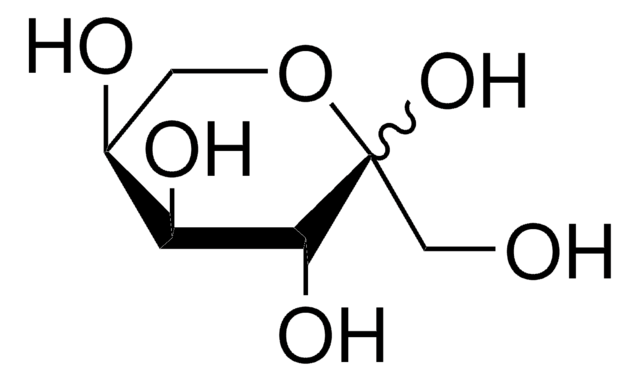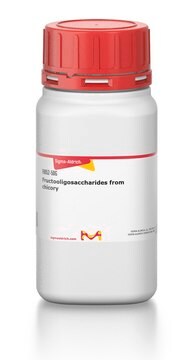47740
D-(−)-Fructose
≥99.0% (HPLC), suitable for microbiology
Synonim(y):
D-Levulose, Fruit sugar
About This Item
Polecane produkty
Poziom jakości
Próba
≥99.0% (HPLC)
Postać
powder
aktywność optyczna
[α]20/D −92±2°, 1 hr, c = 10% in H2O
pozostałość po prażeniu
≤0.1% (as SO4)
strata
≤0.1% loss on drying, 20 °C (HV)
mp
119-122 °C (dec.) (lit.)
rozpuszczalność
H2O: 0.1 g/mL, clear, colorless
ślady anionów
chloride (Cl-): ≤50 mg/kg
sulfate (SO42-): ≤50 mg/kg
ślady kationów
As: ≤0.1 mg/kg
Ca: ≤10 mg/kg
Cd: ≤5 mg/kg
Co: ≤5 mg/kg
Cr: ≤5 mg/kg
Cu: ≤5 mg/kg
Fe: ≤5 mg/kg
K: ≤50 mg/kg
Mg: ≤5 mg/kg
Mn: ≤5 mg/kg
Na: ≤50 mg/kg
Ni: ≤5 mg/kg
Pb: ≤5 mg/kg
Zn: ≤5 mg/kg
Zastosowanie
microbiology
ciąg SMILES
OC[C@@H](O)[C@@H](O)[C@H](O)C(=O)CO
InChI
1S/C6H12O6/c7-1-3(9)5(11)6(12)4(10)2-8/h3,5-9,11-12H,1-2H2/t3-,5-,6-/m1/s1
Klucz InChI
BJHIKXHVCXFQLS-UYFOZJQFSA-N
Szukasz podobnych produktów? Odwiedź Przewodnik dotyczący porównywania produktów
Opis ogólny
Działania biochem./fizjol.
Kod klasy składowania
11 - Combustible Solids
Klasa zagrożenia wodnego (WGK)
WGK 1
Temperatura zapłonu (°F)
Not applicable
Temperatura zapłonu (°C)
Not applicable
Środki ochrony indywidualnej
Eyeshields, Gloves, type N95 (US)
Wybierz jedną z najnowszych wersji:
Masz już ten produkt?
Dokumenty związane z niedawno zakupionymi produktami zostały zamieszczone w Bibliotece dokumentów.
Klienci oglądali również te produkty
Produkty
Podłoże hodowlane zapewnia środowisko z odpowiednimi składnikami odżywczymi, źródłami energii i określonymi warunkami środowiskowymi dla wzrostu mikroorganizmów. Składniki podłoża hodowlanego obejmują zarówno cukry proste, jak i peptony, sole, antybiotyki i złożone wskaźniki.
Nasz zespół naukowców ma doświadczenie we wszystkich obszarach badań, w tym w naukach przyrodniczych, materiałoznawstwie, syntezie chemicznej, chromatografii, analityce i wielu innych dziedzinach.
Skontaktuj się z zespołem ds. pomocy technicznej






